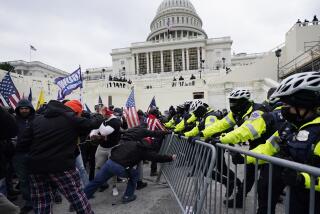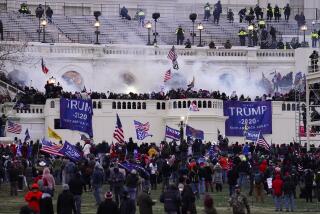High Court Restores RICO Conviction of Ex-Attorney : Judiciary: Justices rule that the racketeering law extends to any business impacted by drug money. Decision strengthens reach of criminal statutes.
- Share via
WASHINGTON — The Supreme Court on Monday reinstated the racketeering conviction of a former federal prosecutor who turned to crime and also ruled that the federal racketeering law reaches virtually any business touched by drug-tainted money.
The 9-0 ruling reverses a decision of the federal appeals court in San Francisco, which last year limited the scope of the federal Racketeer Influenced and Corrupt Organizations Act.
More broadly, Monday’s decision signals that the high court is not embarked on a mission to cut back generally on the reach of federal criminal laws.
Last week, the justices, in a surprising departure, struck down the federal Gun-Free School Zones Act and ruled that Congress had no power to get involved in a purely local crime problem near a school.
The Constitution says that Congress may “regulate commerce . . . among the several states” and it is this authority that Congress has used to pass laws on matters as varied as minimum wages, civil rights, the environment and gun control.
But Chief Justice William H. Rehnquist said that a gun-toting student lurking outside a school has “nothing to do with any sort of economic enterprise” and is therefore beyond the scope of Congress’ power.
For decades, conservatives have complained that Congress has been too willing to meddle in local problems and last week’s 5-4 ruling was seen by some as the beginning of the conservative court’s campaign to limit the reach of the federal government.
But Monday’s decision in the racketeering case shows all the justices agree that Congress can regulate almost any activity that is commercial.
A business that buys goods or services from elsewhere is surely “engaged in interstate commerce” and is subject to regulation by Congress, the court said in an unsigned opinion in the case (U.S. vs. Robertson, 94-251).
The case began in 1990 when federal agents arrested Juan Paul Robertson outside his Pacific Palisades home and charged the lawyer with running a cocaine ring.
An honors graduate of the Georgetown Law School and an assistant U.S. attorney between 1976 and 1980, Robertson left government and went to work as a criminal defense lawyer in Los Angeles representing accused drug criminals.
Within a few years, however, he was taking huge amounts of drug money for his own use, prosecutors charged. In November, 1983, he took a Cadillac from a client in Reseda and drove away with $980,000 in cash and two kilograms of cocaine. He used the money to buy a house in Phoenix and a gold mine in Alaska.
Robertson eventually was charged with violating narcotics laws and with a RICO violation over the gold mine. Congress passed the racketeering law in 1970 to give prosecutors a weapon against mobsters who use ill-gotten gains to buy legitimate businesses. One provision of the law allows judges to impose longer sentences if illegal profits are reinvested in legitimate business.
A jury in San Diego convicted Robertson in 1992 and U.S. District Judge Leland C. Nielsen sentenced him to 20 years in prison.
But last year, the U.S. 9th Circuit Court of Appeals threw out the RICO violation on grounds that the Alaska gold mine was a “small and entirely local operation,” beyond the bounds of federal jurisdiction.
Clinton Administration lawyers appealed, arguing that this theory, if upheld, would cut a hole in the racketeering law and could conceivably undercut an array of federal statutes.
Robertson is serving his time in a federal prison in New Mexico but he will get a new sentencing hearing thanks to another part of the 9th Circuit’s decision that said the original judge made a sentencing error, according to Robertson’s attorney, Glenn Stewart Warren of San Diego.
In other action, the court:
* Agreed to decide whether states may ban all advertising of liquor and beer prices (44 Liquormart vs. Rhode Island, 94-1140). The 21st Amendment, which repealed Prohibition, gave states the broad power to regulate the sale of alcohol, but sellers have said that they have a First Amendment right to advertise.
* Let stand a ruling that forced a Michigan high school to remove a portrait of Jesus Christ that had hung in the hallway for 30 years (Bloomingdale Public Schools vs. Washegesic, 94-1383). In 1980, the high court ordered the school to remove a poster containing the Ten Commandments.
More to Read
Sign up for Essential California
The most important California stories and recommendations in your inbox every morning.
You may occasionally receive promotional content from the Los Angeles Times.














